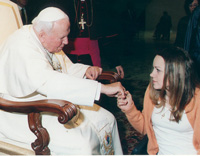 The late great John Paul II passed away three years ago today. My family and I were very fortunate to have the chance to greet the late pontiff in Feb. of 2001. Once we found out that handicapped people, people in wheelchairs, automatically get to go up and greet the pope after his general audience we couldn’t get to Rome fast enough. My middle sister and I were able to greet him after the Wednesday audience on Feb. 14 and a few days later the rest of my family, my parents and my younger sister, received a special invitation, at the request of a dear priest friend of ours, to greet him with a group of people after his daily Mass (I will post all of their pictures below).
The late great John Paul II passed away three years ago today. My family and I were very fortunate to have the chance to greet the late pontiff in Feb. of 2001. Once we found out that handicapped people, people in wheelchairs, automatically get to go up and greet the pope after his general audience we couldn’t get to Rome fast enough. My middle sister and I were able to greet him after the Wednesday audience on Feb. 14 and a few days later the rest of my family, my parents and my younger sister, received a special invitation, at the request of a dear priest friend of ours, to greet him with a group of people after his daily Mass (I will post all of their pictures below).
He is now referred to as John Paul the Great, but I will always know him simply as JPII. No doubt he was a great and magnificent world/religious leader, but to some of us who grew up under his pontificate, he was also a gentle and humble shepherd who seemed as close and personal to us as our own fathers.
For me the greatest legacy he left us was his enthusiasm for articulating the Church’s committment to building a culture of life. There are a number of ways in which a culture of life must be built. First, quite obviously, is recognition and respect for the unique dignity of the human person.
Theology of the Body is JPII’s vision of the human person and what it means to be made in the “image and likeness of God.” In writing Witness to Hope: The Biography of Pope John Paul II, author George Weigel concluded that TOB, a collection of 129 Wednesday audiences given between 1979-1984, was JPII’s
“longest-lasting theological contribution to the Church…a bit of a theological time bomb…that would explode within the Church at some indeterminate point in the future…reshaping the way Catholics think about our embodiedness as male and female, our sexuality, our relationships with each other, our relationship with God – even God Himself”
In TOB JPII encourages a true reverence for our bodies and the gift of our sexuality and challenges us to live it in a way worthy of our great dignity as human persons (from the TOB website).
The incomparable worth of every human being, he points out in Evangelium Vitae, is revealed in the Incarnation. When the Son of God came to earth and took on human form, he came that we might have life (Jn. 10:10)! “Thus the deepest element of God’s commandment to protect human life is 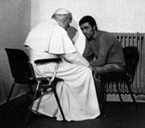 the requirement to show reverence and love for every person and the life of every person.” This is not only true for weakest and most innocent members of our society – the poor, the sick, the unborn, the elderly, the embryo in a petri dish – but it includes loving the life of a criminal, of our enemies (Mt. 5:44), as he showed by visiting and forgiving the man who tried to kill him.
the requirement to show reverence and love for every person and the life of every person.” This is not only true for weakest and most innocent members of our society – the poor, the sick, the unborn, the elderly, the embryo in a petri dish – but it includes loving the life of a criminal, of our enemies (Mt. 5:44), as he showed by visiting and forgiving the man who tried to kill him.
Many of the problems in our society stem from the breakdown of the family. In Familiaris Consortio, John Paul recognizes the “precious value of marriage and of the family“, especially when it comes to educating the essential values of human life. The family is the “first vital cell of society” and by embracing the plan of God for marriage and family, Christian families will contribute to the “renewal of society and of the People of God.”
A culture that respects all human life must have a joyful acceptance of human suffering. As we saw with the starvation of Terri Schiavo and many cases like hers, our society  has a great disdain for human suffering which leads to the tragic death and outright murder of people whose lives are considered worthless. We can counter this by following the example of JPII whose physical health gradually deteriorated after the gun shot wound that almost took his life. Despite the obvious pain and suffering that came with his sickness, the pope never let it slow him down. Even in his final days, when his health was at its worst, he struggled to be in front of the faithful. In 1984 he also wrote the Apostolic Letter on the Christian Meaning of Human Suffering, Salvifici Doloris.
has a great disdain for human suffering which leads to the tragic death and outright murder of people whose lives are considered worthless. We can counter this by following the example of JPII whose physical health gradually deteriorated after the gun shot wound that almost took his life. Despite the obvious pain and suffering that came with his sickness, the pope never let it slow him down. Even in his final days, when his health was at its worst, he struggled to be in front of the faithful. In 1984 he also wrote the Apostolic Letter on the Christian Meaning of Human Suffering, Salvifici Doloris.
Finally it must be said that those living according to the culture of death are not without hope. In his 2002 address to the U.S. Cardinals in response to the sexual abuse scandal John Paul said,
“we cannot forget the power of Christian conversion, that radical decision to turn away from sin and back to God, which reaches to the depths of a person’s soul and can work extraordinary change.”
A culture of life requires recognition of, and a relationship with, He who is Life itself. This is to be its very foundation. For Christ said, “I am the way and the truth and the life” (Jn. 14:6) and those who believe in Him shall not perish, but have eternal life (Jn. 3:16)! God is nothing if not merciful and it is never too late to come back to Him with all our heart.
JPII was a great leader in the fight against the culture of death. Hopefully we will learn from his example and work to advance the culture of life with the same enthusiasm as the late pontiff. JPII, WE LOVE YOU!
BTW, Pope Benedict is no slouch either. He’s been very vocal about life issues, especially what he calls the “difficult problem” of bioethics. Unfortunately I won’t be able to see Benedict when he visits the U.S. in 12 days. Maybe it’s time for another trip to Rome…
My family with JPII:
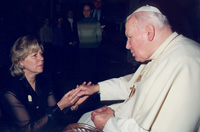
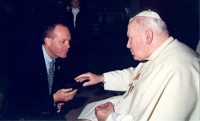
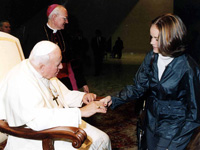
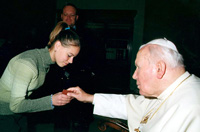
One Comment on “JP II and the Culture of Life”
This is a beautiful tribute. Thank you for sharing this amazing blessing with us!